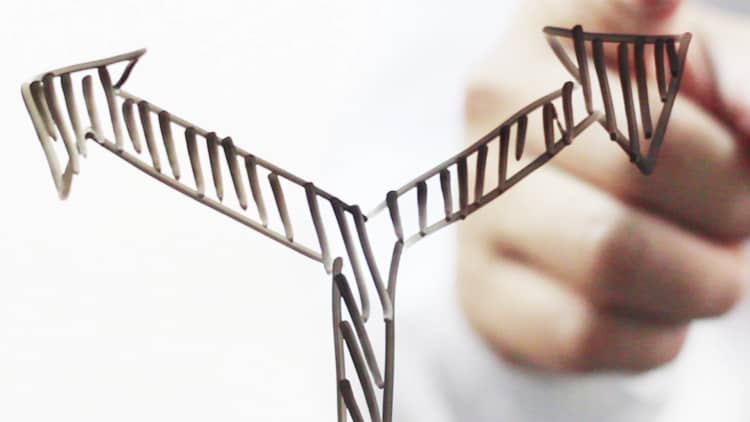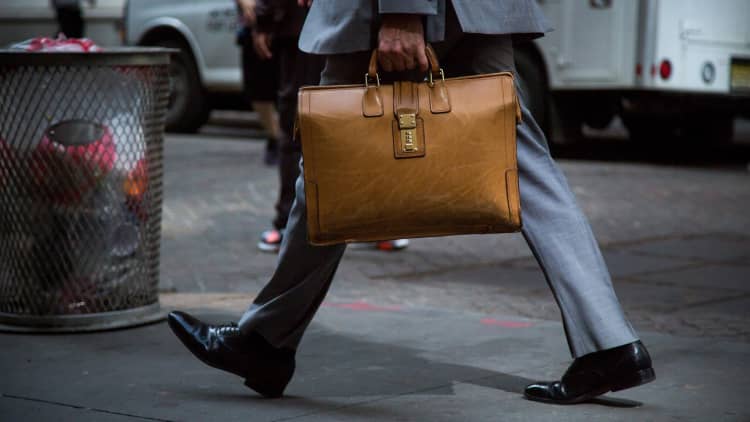Earning your first paycheck is liberating, but knowing what to do with it is far from simple. After all, many of us are never taught the basics of money management.
To help, CNBC spoke to Carolyn McClanahan, certified financial planner and founder of Life Planning Partners, and Katharine Perry, financial consultant at Fort Pitt Capital Group, about the smartest things to do with your money upon entering the working world.
Before blowing your first couple of paychecks on a shopping spree or tropical vacation, consider these seven smart money moves.

Enroll in your employer's 401(k) plan
"Start contributing to your company's 401(k) plan as soon as possible," says Perry. It's one of the simplest ways to put your money to work and jumpstart your retirement savings.
In terms of how much you should be contributing, the more the better, but you'll want to at least take full advantage of the company match — which is essentially free money — if it offers one. The way it works is, your company will match whatever contribution you put towards your 401(k) up to a certain amount. For example, if you choose to put 4% of your salary into your account, your employer will put that same amount in as well, in effect doubling your contribution.
But you only get their money if you put yours in first.
Next, you'll want to get in the habit of increasing your contributions consistently, either every six months, at the end of the year, or when you get a bonus or a raise. Check online to see if you can set up "auto-increase," which allows you to choose the percentage you want to increase your contributions by and how often.
If your employer doesn't offer a 401(k) plan, you have options, such as contributing to a Roth IRA or traditional IRA, which are both individual retirement accounts that offers tax breaks.
"Sometimes, with a first job, you may not have a huge paycheck, so there may not be a lot left over each month, but you at least want to put something away," says Perry. Start small and work your way up to contributing 10% of your pretax income, which is what most experts recommend.

Monitor your cash flow and track your spending
You need to ensure you're bringing in more money than you're spending, McClanahan emphasizes.
She recommends recording each and every purchase you make for a couple of months. "It's good to understand where you spend your money, and if you find that you're spending more than you make, figure out where you can cut back," she says.
There are a handful of apps that will track your spending for you, such as Mint, Personal Capital, and Level Money. You can also use a spreadsheet on your computer or simply record your everyday purchases in a notebook or on your phone.

Pay down debt
Whether it's medical bills, credit card debt, or student loans that have you in the red, create a plan for how to get back into the black.
You can start tackling your debt one of two ways, McClanahan tells CNBC: "Pay off the highest interest rate debt first, or pay off the things that have the smallest balance first. Whatever feels better to you."
Prioritizing the debt with the highest interest rate means you'll pay less over the life of your loans.
The second option — ranking your debt in order of size and starting with the smallest debt — is a strategy that personal finance expert Dave Ramsey calls the "snowball method." The idea is that each time you pay off one form of debt, you build momentum, which helps you tackle the next biggest, and so on.

Set specific savings goals for future purchases
There are going to be bigger purchases in your future, such as a car, home, graduate school, or an education for your kids. The sooner you start setting aside money for these expenses, the better.
The most effective way to save for these big-ticket items is to have a certain amount of money automatically deducted from your bank account and sent to a savings account, says Perry: "Do it on the same day you get paid. You'll never even see that money and it's a really easy way to make sure you stay consistent with your savings."
It may be helpful to set up multiple savings accounts in order to save for specific purchases. Check the online interface of your bank and see if you can create sub-savings accounts.

Start an emergency fund
Life doesn't always go as planned. You could lose your job, have a medical emergency, or deal with a car breaking down. It's important to have a safety net just in case.
Ideally you'll never need this money — and it's important to keep your hands off of it for anything other than a real emergency — but it's important to start building a rainy day fund that will cover three to six months worth of living expenses. Of course, "you're not going to have three to six months worth right away," Perry notes. "But if you contribute a little bit of money every month to this account, it'll build up to that point."
Consider putting it in a high-yield savings account, which offers a higher interest rate. Plus, by moving this money to a separate account, you're establishing a barrier between your emergency savings and your other savings, so you don't accidentally blow it on a new pair of shoes.

Get the insurance you need
As tempting as it may be to save a bit of money each year by forgoing insurance, that could come back to haunt you.
Buying the right policies for your situation is critical to a healthy financial life. After all, just one accident can be detrimental to your finances, McClanahan says: "Medical debt and serious injuries are one of the main things that put people into bankruptcy."
Insurance policies are largely personal. To get the best coverage for your specific situation, educate yourself by shopping around and getting multiple quotes, reading your policy closely before signing on, and asking questions when you don't understand.
Read more about choosing the right insurance plan for you.

Get in the habit of going over your finances
While it's great to put your finances on auto-pilot, you'll want to get in the habit of reviewing your retirement contributions, savings goals and insurance policies at least once a year, Perry says.
Are you setting aside enough for your future? Are there expenses you can cut back on in order to save more for an eventual home, car, or kid? If you've built a solid emergency fund and are maxing out your retirement accounts, do you have money left over that you can start investing elsewhere?
"Review things and be honest with yourself," Perry says. "You'll still want to allow yourself money to have fun, however, your future self will thank you for having discipline and setting aside more money now."
Don't miss: 11 simple money habits that will help you build wealth in 2017


